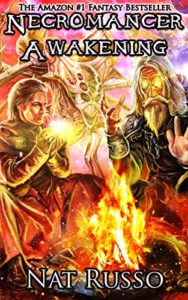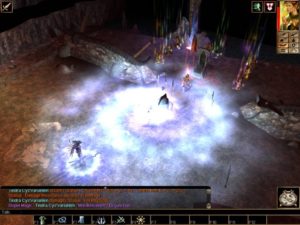 I’ll admit Necromancer Awakening has one of the most gripping opening chapters I’ve seen. Nicholas Murray, archeology student, is getting ready for his adoptive father’s funeral – a man who took him on as a teenager and got him where he is now – when supernatural visions cloud his sight and he’s sucked into another world before his girlfriend’s eyes.
I’ll admit Necromancer Awakening has one of the most gripping opening chapters I’ve seen. Nicholas Murray, archeology student, is getting ready for his adoptive father’s funeral – a man who took him on as a teenager and got him where he is now – when supernatural visions cloud his sight and he’s sucked into another world before his girlfriend’s eyes.
I’m afraid the first third of the book was a struggle to get through. While I acknowledge that being yanked away from everything you’ve ever known would be stressful and disorienting, the cliché of whiny, clueless protagonists and grumpy, impatient mentor-figures gets old fast.
I also quickly lost patience with the potty mouth language. There might be grown-up men who actually say “arse” that much, but they’re nobody I’d want to respect and learn from.
Fortunately, Nicholas is separated from this mentor and plunged into a community that is more interested in giving him lessons than condescending insults, and he himself leaves off swearing at everyone in sight long enough to actually learn cool magic and backstory things, and show more initiative in taking actions.
From there, things really start to build. Mr. Russo has developed a magic system that feels as real as anything I’ve experienced in Neverwinter Nights, with an actual reason in-world for why raising the dead is not only possible but necessary.

Image credit: Wikipedia
I don’t get bent out of shape over fantasy worlds that have fantasy deities, but as this book deals with a man crossing the barrier between our real world and this fantasy one, it’s opened itself to religious criticism 😉. I’ll confine my remarks to two comments:
While the deities of Erindor exhibit a refreshing lack of Greek pettiness and give hints of seeing a larger picture than the mortals can grasp, any “god” who “needs” the help of a mortal – or even lessons in compassion from him – pales.
Second, as I was reading I found myself exceedingly glad the purification of my soul does not depend either on some fallible mortal priest’s work nor on my own remorse, but on the substitutionary sacrifice of God’s Son, Jesus. Mr. Russo’s Catholic background does help explain the way he’s constructed his cosmic justice system.
Nicholas’s motivations are well handled, moving eventually (but not too quickly) from “I just want a ticket back to my girlfriend” to “I must help these people.” His continued struggle over whether saving this fantasy world will sever his only possible means of returning to his true love is also about as nuanced as you could ask for.
With the language and violence, Necromancer Awakening  is not for the faint of heart or stomach. But if you don’t mind those, and like fantasy with necromancers fulfilling an honest-to-goodness religious function, you can try it…or just wait for Atari to option to video game rights. Seriously, I could taste some of the zone changes, and he’s already designed the quick-bar icons.
is not for the faint of heart or stomach. But if you don’t mind those, and like fantasy with necromancers fulfilling an honest-to-goodness religious function, you can try it…or just wait for Atari to option to video game rights. Seriously, I could taste some of the zone changes, and he’s already designed the quick-bar icons.
Necromancer of Erindor: the Video Game – “soon” available for pre-order on Steam!
Disclaimer: I received a free ebook copy as a part of Mr. Russo’s birthday promotion. Thanks! He isn’t responsible for any of my opinions.
The book is available on Amazon, and the author’s website is ErindorPress.com (here).

Pingback: "The Road to Dar Rodon" by Nat Russo - Kimia Wood
Pingback: Why "Avatar: The Last Airbender" Was Good—But Not Great - Kimia Wood